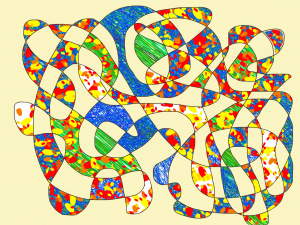
A reason the interview wa so enjoyable was that they asked really interesting, incisive questions about the stories in Near + Far, in that way a writer desires and dreads at the same time, where they’re seeing some of your psyche’s underpinnings shaping the stories that you create. I’ve been mulling over some of those questions since then, and was thinking about one on the bus home the other day.
They pointed to many of the stories being about the need for connection, with characters like the protagonist of “Angry Rose’s Lament” being addicted to a drug that makes him feel connected, the hero of “Therapy Buddha” projecting all his needs onto a toy, or Sean Marksman’s ultimate fate in “Seeking Nothing.” Going through other stories in my head, I see the theme of connection coming up in various forms throughout. I think that’s a basic human need, one born of monkey roots, an instinct to be with the other monkeys.
Connection’s been something I’ve sought throughout my life. I was a brainy and isolated child, and still am to some extent. NowadaysI work in a profession that requires stretches of isolation in order to produce. So I value my time spent with other people, and particularly writers and likeminded people. I know that I’m happiest when I’ve got a group of interesting and lovely friends doing wonderful things and setting the world afire, just as I know that without some of them I would be a much different person.
Still, it’s not something I’m alone in exploring, as a writer. Human connections — gone awry, gone swimmingly, mistaken or acute, agape or philia or eros — are what fiction is made of.
At a panel at this year’s Worldcon, a fellow panelist got quite huffy when I mentioned the idea that fiction teaches us about being human. He found the idea outmoded and far too 19th century. Perhaps the divergence lay in our conceptions of what the word “teach” means — and perhaps “demonstrates” or “discusses” would be a better verb there, but I don’t know. We’re all just flailing about trying to fit into our own particular monkey packs and we’re watching the other monkeys to see what they’re doing and what we’re supposed to be doing. Don’t we read fiction to find some of that information? Perhaps we don’t say to ourselves, “I will be like character X in Book Y,” but we do think about heroes. We try to be better human beings sometimes because we have their examples. Or perhaps to avoid whatever fictional fate they fell prey to.
So, yeah. Connections. In fiction, the connections between characters, the way they choose to interpret word or gesture or telepathic scream. In the absence of human (or perhaps, intelligent, rather than human) connection, they make imaginary ones, creating fiction within fiction. That’s one of the things I’m looking at in the book I’m currently working on, focusing on the connections between the main character and the beings around her. It’s let me plunge into her head in a way I haven’t before, and I’m enjoying the heck out of it, connecting with her.








2 Responses
As a professional student of humanity, I agree with you that fiction – story, really – does teach us about being human, and that we seek it out for that reason. If anything we need it more than in the 19th century. We never stop because we are living in a constantly shifting environment as our technology changes the ways we interact and bring us into increasingly larger social spheres yet isolate at the same time.
I recently read a great book called ‘The Storytelling Animal’ by Jonathan Gottschall. He lays out all the best neurological and evolutionary arguments for our drive to tell and consume story in a compelling way (he uses story).
I’ll have to look for that, it sounds fascinating.